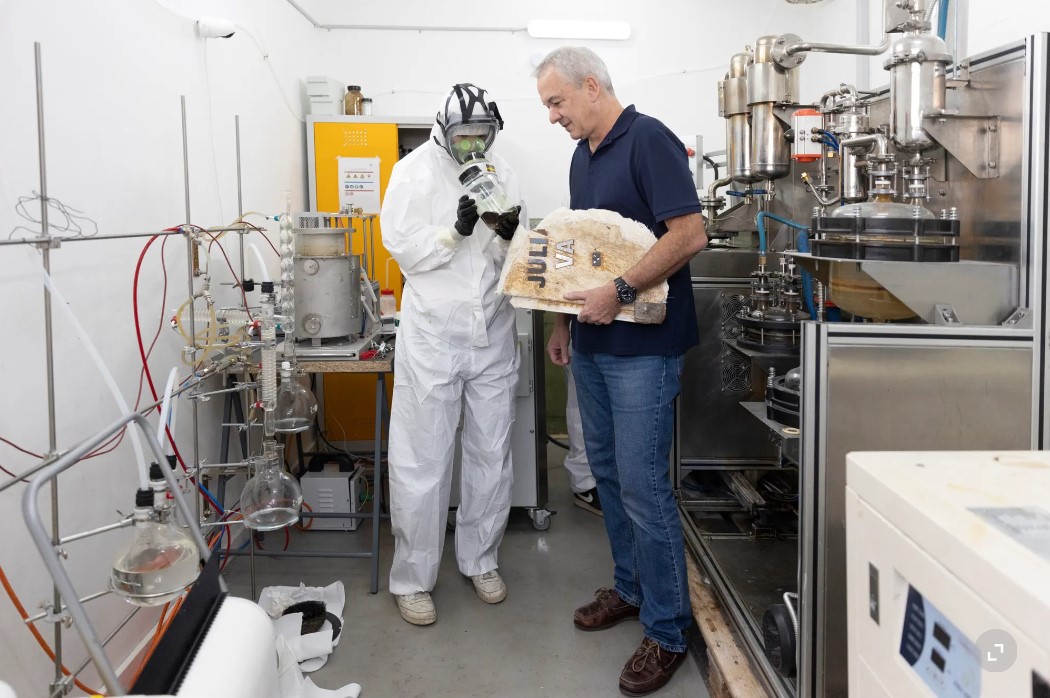
Composite Recycling Pyrolysis lab. Photo credits Odile Meylan.
Link to article on 24 Heures site here (requires subscription)
Link to French-language pdf of article here
English translation of article below
The start-up extracts the fiberglass of abandoned boats in order to make new composites and plastics.
In Europe, 2 million tonnes of boat hulls are awaiting a disposal solution. And the numbers of these end-of-life boats continue to explode. The glass fiber-reinforced plastic (GFRP) which composes them is therefore a global pollution problem. In Écublens, Composite Recycling has developed a technology to recycle the materials from these abandoned fiberglass hulls into reusable glass fibrers and pyrolysis oil. These can be used to make new composites and plastics.
“With new environmental regulations, sustainability is essential for the continued development of composites,” says Guillaume Perben, CEO and co-founder of Composite Recycling. “The current means of disposal is not sustainable. They are either burned or landfilled.”
However, under pressure from the Union European, governments are beginning to manufacturersto find an end-of-life solutionlife for their products. InFrance, where 200,000 tonnes of ship hull waste await treatment, this obligation has just been applied toboat builders.
But the question of recycling fiberglass boat hulls, which represent a significant portion of the boat, had not yet been resolved. Composite Recycling rushed into this breach. “Our fiberglass recycling solution solves this challenge, significantly reducing the environmental impact of the manufacturing process,” explains Guillaume Perben.
The start-up, which collaborates with the Federal Polytechnic School of Lausanne (EPFL), has developed a mobile pyrolyzer unit facilitating the separation of the fiberglass from the resin which bonds them together. A bondthat makes boats, or even the blades of wind turbines, very resistant.
The Composite Recycling technique of pyrolysis consists of heating the composite to a high temperature, but without oxygen. The resin does not burn but is transformed into vapor. Separated from the fiberglass, it then becomes oil that can also be sold and reused. And, above all, the process allows the preservation of the precious fiber glass in such a way as to make it reusable.
A chance encounter
It was a chance encounter that was at the origin of it all. A sailor himself, and concerned about the environment and the fact that his boat was not recyclable, Guillaume Perben spoke about this frustration to a friend and physicist during a neighborhood birthday party: “He told me that a solution existed,” smiled the head of Composite Recycling. “The idea of recycling composites was then born in my mind.”
In the start-up headquarters in Écublens, the excitement is palpable. “We have construction going on non-stop,” confides the CEO. Founded in 2021, the company acquired its premises in 2022, which have continued to expand since. In total, nine people work there, including engineers,scientists and salespeople.
Its mobile pyrolyzer unit, the first of which is expected for summer 2024, fits in a container that can be easily shipped to process fiberglass waste on the client’s site. It will thus be able to support boat deconstruction centers in France or elsewhere in Europe. Composite Recycling has also established technical partnerships with leading companies in various sectors, including boat manufacturer Bénéteau Group and the Chomarat textile group.
From aeronautics to microchips
“We are closing the loop to make the composites industry sustainable,” enthuses Guillaume Perben. “Glass fibers have been used until now for surprising innovations, in boating, but also in automobiles, aeronautics, trains, or even michrochips. Long may this continue. We arein the process of industrializing our solution, which is patented. Wewill be able to sell the recovered materials.”
To date, attempts to use pyrolysis for composites have mainly been made with installations treating all types of trash: tires, plastic chairs or organic waste. But to ensure a uniform temperature in the enclosure, the waste must be shredded. However, this damages the composite fibers and therefore their recycling value. For the concept to work, it is a matter of preserving the fibers. Which is the goal of the start-up from Écublens, and why they focus on a single type of waste only.
Claude Béda, 24 Heures
